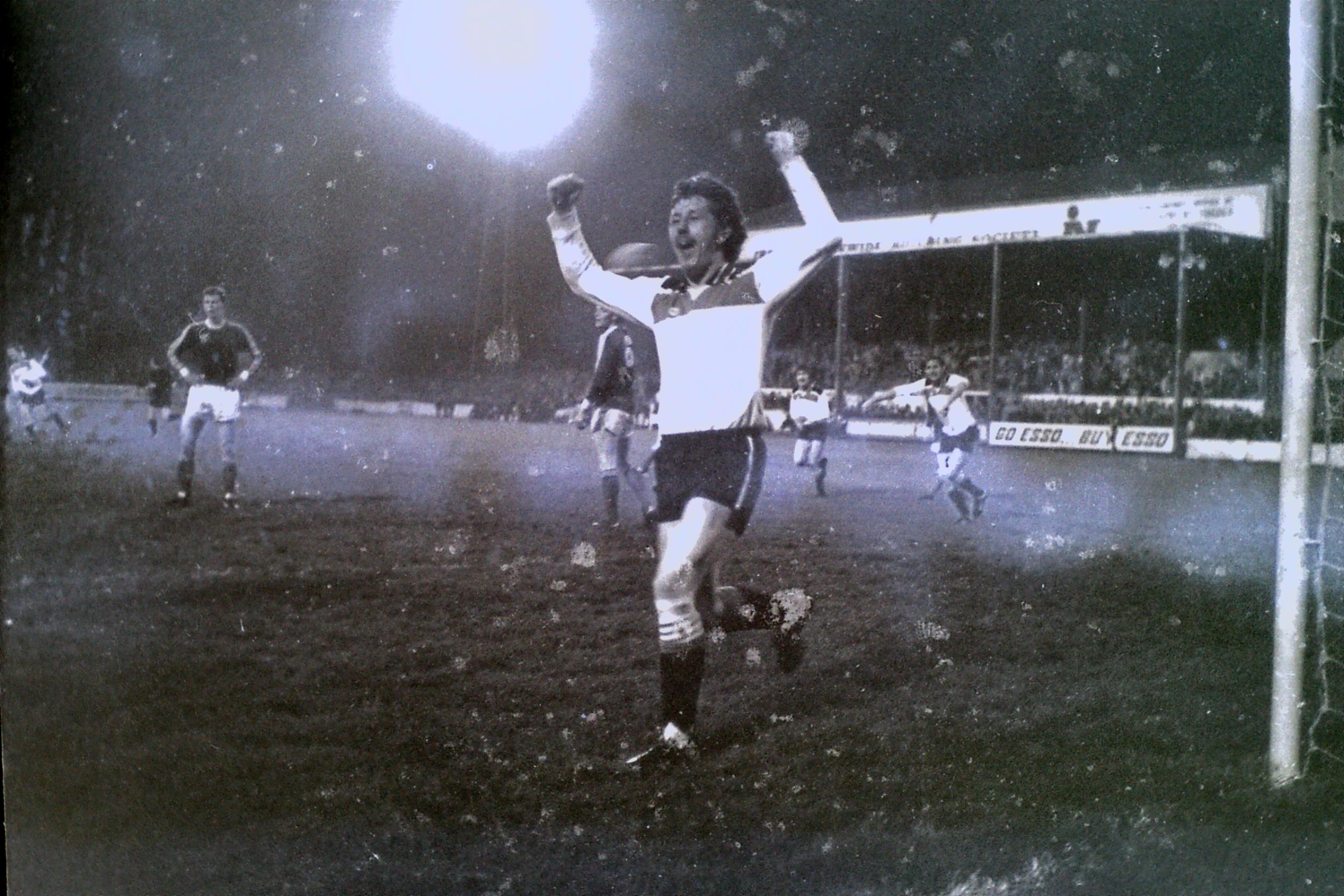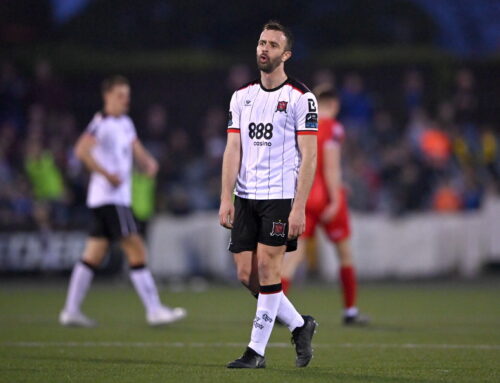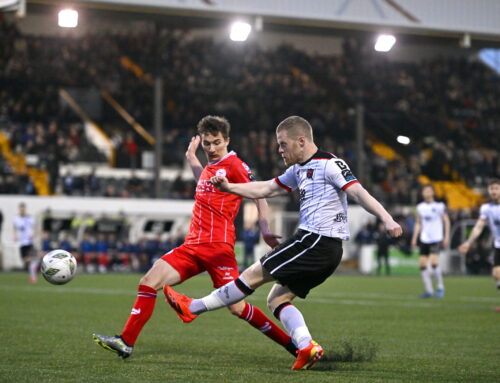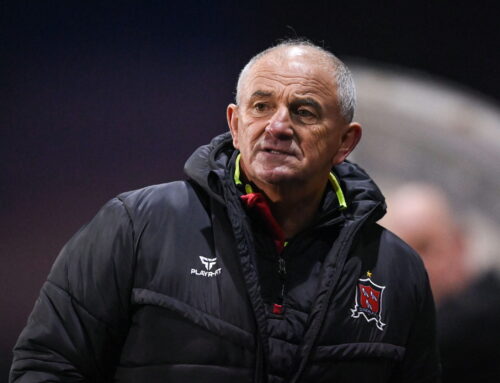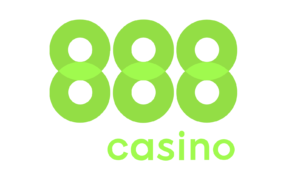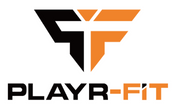We take a look back at Dundalk’s first meeting with Icelandic opposition, against Fram Reykjavik in the 1981/82 European Cup Winners Cup.
After seeing their team go toe-to-toe with European heavyweights such as Celtic, PSV Eindhoven and FC Porto in previous years, there weren’t too many Dundalk supporters licking their lips at the prospect of facing Fram Reykjavik in the first round of the 1981/82 European Cup Winners Cup.
The Icelandic cup winners of 1981 were far from being a household name but after notching up 12 games against continental opposition since they first qualified for European competition 10 years earlier, it meant that Jim McLaughlin’s men could take nothing for granted, even if Dundalk were regarded as hot favourites to advance.
The first leg in Iceland represented something of a trip into the unknown. Unlike today, it was hard to gauge the quality of the opposition with the Democrat perhaps summing up the mood locally when it wrote that ‘nobody knows the standard of football in Iceland, where soccer can’t be on a very big scale as the Reykjavik headquarters has only an 11,000 capacity’.
Of even bigger concern to the Democrat reporter was the conditions in Iceland. ‘We don’t know much, except that as Iceland is in or about the Arctic circle, the climate may be very cold.’ The Irish Independent were a bit more in-depth, describing Fram as ‘seasoned campaigners and a remarkably consistent team’ who had to be ‘approached carefully by Jim McLaughlin’s team’.
Another yardstick to gauge Dundalk’s opponents was the Icelandic international team, who recorded a victory over Turkey in a 1982 World Cup qualifier before the first leg in Reykjavik. Four of their players came from Fram, including Marteinn Geirsson, Iceland’s most capped player.
Keen to get a look at Fram in the flesh before the sides locked horns, McLaughlin, along with board member Jim Reilly, flew out to watch them in action in a league game five days before the first leg while a 14-man Dundalk squad, which included 19-year-old local lad Barry Kehoe, flew out the day before the game.
They made the trip on the back of an unconvincing win over UCD in the opening game of the brilliantly named Kentucky Fried Chicken League of Ireland Premier Division season at Oriel Park on September 10th, 1981. Goals from Sean Byrne and Leo ‘Pop’ Flanagan secured McLaughlin’s men a 2-0 victory but the Democrat wasn’t convinced by the performance as shown by its headline: ‘This form not good enough for Iceland’.
First Leg: Fram Reyjkavik 2-1 Dundalk FC
A crowd of 5,000 turned out at the Laugardalsvöllur for the first leg, which was broadcast live on Icelandic television, on Wednesday, September 16th. Unfortunately, in 2022, Fram moved to a new home, Framvöllur, where the first leg against Dundalk took place last week, denying us a return to the same venue the Lilywhites graced 42 years earlier!
With a number of seasoned European campaigners in their ranks, Dundalk showed all of their experience in the first half, sucking up everything Fram could throw at them before claiming the all-important away goal in the 25th minute. Eamonn Gregg’s cross from the right was brilliantly pulled down by Mick Fairclough with his left foot and he showed great strength to hold off a Fram defender and toe-poke the ball past Gudmundur Baldursson with his right.
The pendulum swung in the second half and Fram equalised in the 65th minute when Gudmundur Torfason outjumped four Dundalk players, including goalkeeper Richie Blackmore, to make it 1-1.
The visitors were still coming to terms with being hauled back when they fell behind less than five minutes later. A corner from the right was met by Hafpor Sveinjonsson, who saw his header cleared off the line by Gregg, only for the ball to cannon back off the helpless Blackmore and roll into the net!

Dundalk FC captain Richie Blackmore exchanges handshakes with his Fram counterpart before the second leg at Oriel Park in 1981.
“We were in complete control in the first half, and that is how it should have stayed,” said a frustrated McLaughlin afterwards. “At least we have a way goal to our credit, and I think we will be able to finish the job at Oriel Park.”
McLaughlin’s sentiments were echoed by many in Dundalk with the Democrat’s headline: ‘Dundalk let a chance slip in Iceland’ summing up the frustration.
‘The result is being accepted here with mixed feelings; some people feel that Dundalk should have been able to win, despite the fact that it was an away game and in strange and distance surroundings, while others take comfort in the view that the margin of a single goal is nothing for an away team to be despondent about.’
‘We could have wished for better than to go into the second leg a goal in arrears, but with past memories of thrilling performances by Dundalk teams in Oriel Park in European competitions, Dundalk fans will be confident that it will be within the competence of this year’s side to move into the second round of the competition.’
DUNDALK FC: Richie Blackmore, Eamon Gregg, Tommy McConville, Paddy Dunning, Martin Lawlor, Leo ‘Pop’ Flanagan, Sean Byrne, Barry Kehoe, Mick Fairclough, Hilary Carlyle, John Archibald (Brian Duff 76).
Countdown to the second-leg
The build-up to the second leg at Oriel Park two weeks later was unusual, to say the least, and four days after returning from Iceland, Dundalk were back in domestic action against Cork United at Turner’s Cross where Hilary Carlyle’s double was enough to sink the Leesiders.
There was no let-up in sight for some of the Dundalk players, however, and the following day, Richie Blackmore, Tommy McConville, Martin Lawlor, Paddy Dunning and Leo ‘Pop’ Flanagan were on a plane to Rio de Janeiro, via London, as part of a League of Ireland select squad, managed by McLaughlin, to face the mighty Brazil.
After holding the Brazilians to just two goals at the break in front of 54,000 fans at the Estádio Rei Pelé in Maceio, the League of Ireland side was put to the sword by the legendary Zico in the second half, as the great man rubbished pre-match reports that he was injured by scoring four goals!
The Brazilian media weren’t happy, with many outlets complaining that the League of Ireland team had been misrepresented as the Irish international team. One title, Jornal Do Brasil, stated that the squad was ‘formed by second-line players.’
A 3-0 win over Finn Harps at Oriel Park six days before the second leg was notable for the return of goalscorer Mick Fairclough, who missed the league game in Cork, and subsequently the League of Ireland’s trip to Brazil, after contracting bronchitis in the days after the first leg in Iceland. His return proved to be hugely important.
With the cost of playing in both legs coming in at around €11,000, Dundalk fans were encouraged to buy tickets and fill Oriel Park with the Democrat also asking the supporters to ‘roar their encouragement to the team from start to finish’ and for there to be ‘no slagging of any player who does something wrong’.
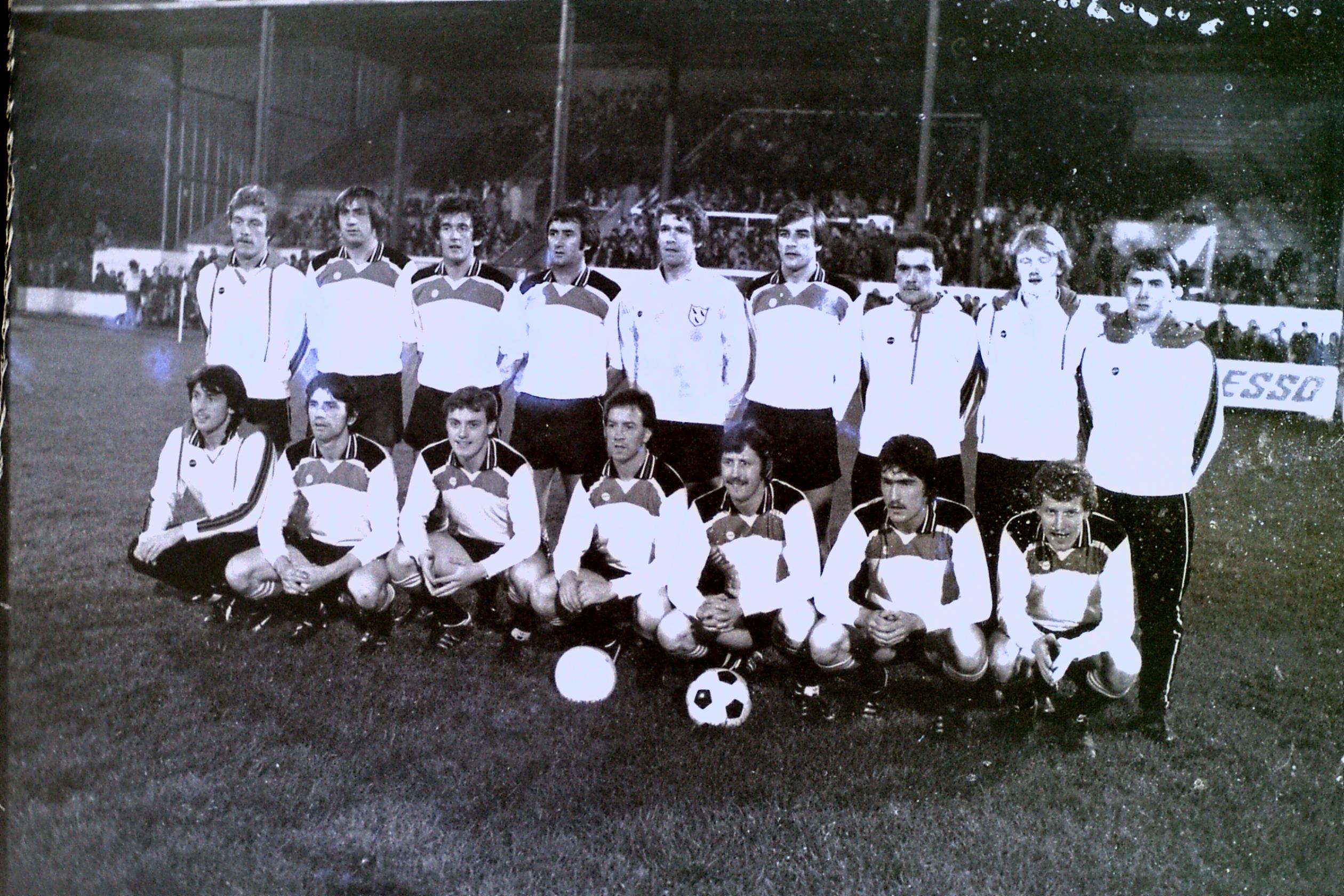
The Dundalk FC team, pictured before the second leg with Fram at Oriel Park in 1981.
The tie came loaded with pressure. It was Dundalk’s seventh European game at Oriel Park under McLaughlin and the Derryman had yet to taste defeat on home soil.
As Mel Moffatt in the Irish Press wrote, ‘Dundalk’s record is impressive for a part-time club, winning two and drawing four.’ The two wins came against Hajduk Split in the club’s very first foray into the European Cup Winners Cup in 1977, followed by the European Cup win over Hibernians Malta two years later but it was the home draws against PSV Eindhoven, Linfield, Celtic and FC Porto that really caught the eye.
With that in mind, Moffett wrote that a defeat against an Icelandic side would be ‘a strange, as well as a shattering experience for McLaughlin and his men.’
Second-Leg: Dundalk FC 4-0 Fram Reykjavik
In the end, there were no such fears as Dundalk breezed through to the second round thanks to a 4-0 win at Oriel Park, a result that has only ever been matched once in the club’s history – a 2021 victory over Welsh outfit Newtown.
‘Iceland may be used to avalanches but not the kind that sunk their standard bearers, Fram FC, in Oriel Park when Dundalk, the Republic’s most seasoned team in European football, recorded their highest win ever in this ultimate sphere of the game, with a resounding 4-0 win,’ wrote the Democrat.
Dundalk got off to a fast start, with their Icelandic opponents completely overrun, and Fram’s hopes weren’t helped by the loss of midfielder Gudmundur Torfason to a harsh red card in the 23rd minute.
McLaughlin’s men made the breakthrough shortly after when Barry Kehoe was taken down in the penalty area by goalkeeper Gudmundur Baldursson and Leo Flanagan made it 1-0 on the night, and 2-2 on aggregate, to put Dundalk in the driving seat on the night, and in the tie.
Mick Fairclough made it 2-0 when he met a Sean Byrne cross to head home the second and send Oriel Park wild before Martin Lawlor all but booked Dundalk’s passage into the next round with a fantastic shot from 15 yards just three minutes after the restart.
Fram had no fight left in them at this stage and the fourth goal put it to bed when Brian Duff made it a record-breaking night in the 62nd minute.
When the dust had settled around Europe, Dundalk were left as the only Irish club left standing in and they got their reward when news filtered through from Zurich the following day.
If Fram was viewed as an underwhelming draw, the same could not be said of the second-round pairing: Tottenham Hotspur were on the way to Oriel Park!
DUNDALK FC: Richie Blackmore, Eamon Gregg, Tommy McConville, Paddy Dunning, Martin Lawlor, Leo ‘Pop’ Flanagan, Sean Byrne, Barry Kehoe, Mick Fairclough (John Archbold HT) (Jimmy Reilly 76), Hilary Carlyle, Brian Duff.

